
 ***** Most people think of Christmas as being a joyous occasion, where everybody is cheerful and smiling. But Thornton Wilder’s “The Long Christmas Dinner” hinges on a universal truth: that the holidays don’t necessarily make us feel happy. For many, this could be a rather sad time of the year: filled with the memories of loved ones who are no longer with us plus reflections, if not regrets, about the course of our own lives. In this rarely produced play, directed by Jacqueline Stone, a series of Christmas dinners take place at the Bayard family home over a period of ninety years. We see the same dining room table, populated by different people, as one generation of the family morphs into the next. The story makes us realize how a pleasant celebration can bring out the sense of time passing—and passing us by. Above all, this is a story about change: Even though the characters claim that time moves slowly, this is not so true in retrospective. When examining one day a year over the course of several generations, we note that things might seem to stay the same until one day they aren’t. Everything can change in an instant—as people grow older, things grow older, and each one of us has to navigate our own way through life.
***** Most people think of Christmas as being a joyous occasion, where everybody is cheerful and smiling. But Thornton Wilder’s “The Long Christmas Dinner” hinges on a universal truth: that the holidays don’t necessarily make us feel happy. For many, this could be a rather sad time of the year: filled with the memories of loved ones who are no longer with us plus reflections, if not regrets, about the course of our own lives. In this rarely produced play, directed by Jacqueline Stone, a series of Christmas dinners take place at the Bayard family home over a period of ninety years. We see the same dining room table, populated by different people, as one generation of the family morphs into the next. The story makes us realize how a pleasant celebration can bring out the sense of time passing—and passing us by. Above all, this is a story about change: Even though the characters claim that time moves slowly, this is not so true in retrospective. When examining one day a year over the course of several generations, we note that things might seem to stay the same until one day they aren’t. Everything can change in an instant—as people grow older, things grow older, and each one of us has to navigate our own way through life.
The story is a microlevel examination of the Bayard family, where the matriarch Mother Bayard (Joan Merlo) takes command from her wheelchair. We see her son Roderick (Matt Miles) and her daughter-in-law Lucia (Alexis Primus), who are proud of their brand new house. Also at their Christmas table is their Uncle Branden (Wain Parham). We see the happy moment when Lucia and Roderick give birth to their two children Charles (Huy Nguyen) and Genevieve (Charlie Irving). But soon the generations evolve and Charles marries Leonora (Seoyoung Park), who have their own children Sam (Parham), Roderick II (Miles), and Lucia II (Primus). Each year there is considerable happiness associated with the births of babies, and I especially liked their introduction into the Bayard family, with a nurse/nanny carrying a “crying bassinet” of swaddling. Yet the focus tends to be more on the loss of something valuable as people, places, and things once loved are now gone forever or are no longer the same.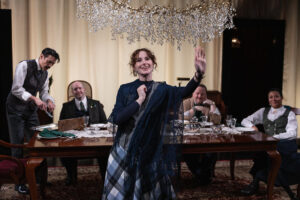
Cleverly done is where characters go down a black draped hallway behind stage right to indicate that they are no longer a part of this world. This is in comparison to the death of one of Leonora’s babies, who presumably was stillborn. In an incredibly well-done scene, we watch how she grieves for the unborn child by looking into the black draped hallway behind stage left. Note that those who are alive and choose to leave home ascend the aisle steps, while those who become a part of the family by marriage or choice descend the aisle steps to come onto the stage. What a skillful bit of directing! What creative set design by Keith Parham!
The transitions from one Christmas holiday to the next is done smoothly and elegantly throughout, again a credit to Stone’s fine directing, not to mention Parham’s excellent lighting design, which allows us to differentiate from one scene to the next. The resplendent light fixture above the dining room table is probably the first thing we notice when we walk into the theatre, with its spaghetti-like tangles of LED lights (which can be adjusted to various colors of white). The shifting color of the ceiling light and changes in the direction and color of other overhead lights allows us to perceive different times of day as well as take notice of changes in family composition and disposition from year to year. The smaller fixtures in the black draped hallways are more classic but equally interesting. Props designer Helen Lattyak has especially done marvels with the plates, the silver, and the glassware that make up the table settings. Rachel Sypniewski’s costume design works extremely well in this show, since the characters have to wear garments that work over the course of ninety years without having to do any costume changes. Music direction by Wain Parham is excellent and nicely befits both the joyousness and sadness of the tale.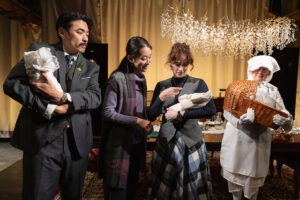
The only flaw (if any) has to do with the script. The play is so busy documenting personal crises and changes in family structure that we lose some of the details that demonstrate closeness and affection that would make the characters memorable. Perhaps this story is more about sharing a family history and legacy rather than experiencing the kind of warmth associated with gathering together. To put things bluntly, the Bayard family as a whole is much too staid and quiet by modern tastes, and a certain casualness is missing from their conversations. Perhaps they are typical of an upper class or upper-middle-class family from about 100 years ago, but I wanted more. There needed to be more of a discussion about hopes, dreams, and fears. I wanted at least one reference to the quality of the food at the table, maybe comparing it to Christmases from previous years. Were there any new recipes? And what would a holiday dinner be without a silly joke or two or some tall tale or anecdote or some piece of juicy gossip? What kind of games did the children play, and what sorts of items might there have been in their Christmas stockings? There is also not enough about the impact of external events on the characters’ private lives. Yes, we observe Roderick’s comment about a President going into a second term and we are made aware of Sam serving in World War II. But, for the most part, I wanted to see a bit more exploration of subjects normally “forbidden”, such as issues surrounding politics and religion. More to the point, I never felt that the story took the extra step in making the audience feel for all the characters as much as we should have, and, as a result, we often don’t get close to them.
While watching the performance, the audience cannot help but think back about those family members who were once prominent in the story of our own lives and who might have sat around our own festive table. We too might use a presumably happy occasion to be nostalgic for times past or dream about the future or think about the times when people we love were not in declining health. We might compare our own family to that of the ideal Norman Rockwell painting—and recognize that the two never match up. Perhaps the holidays become an excuse to reflect upon our own shortcomings or unmet expectations. Perhaps we didn’t accomplish what we might have wanted, whether this has to do with personal and family relationships, having the right job or career, doing enough good for others, or making the best use of the talents and time that we have. Perhaps this is the right moment after all to realize that nothing ever turns out as planned.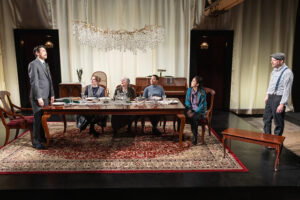
And yet there is a fleeting glint of holiday cheer throughout the show. This is particularly emphasized at the end of the performance when things go full circle and where the eldest member of the family, a cousin named Ermengarde (Merlo), addresses the audience directly while threading popcorn into strands. Not only is a completed strand of popcorn seen as being celebratory, but the sequence of popcorn on a thread could be analogized as the sequence of events in our own life story. When entire strands become something to celebrate, the cast breaks character and gets the audience to clap to their singing. When their display of joyfulness makes time seemingly stand still, the audience is forced to ask: What makes us dwell on life’s direction and meaning in the first place? Isn’t true happiness actually a distraction when we lose ourselves in the moment?
“The Long Christmas Dinner” is playing through December 29, 2024, at Bramble Arts Loft, Beatrice Theatre, 5545 N. Clark Street, Chicago.
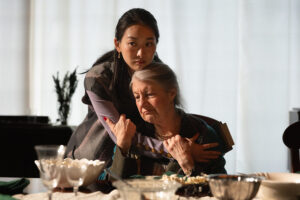 Tickets are $20, $45, $60 (plus a $3.00 ticket fee)
Tickets are $20, $45, $60 (plus a $3.00 ticket fee)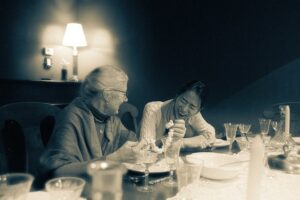
Performance schedule:
Fridays and Saturdays at 7:30 p.m.
Sundays at 3:00 p.m.
Additional holiday week performances on Thursday, December 19; Monday, December 23; and Thursday, December 26 – all at 7:30 p.m.
For further information and to purchase tickets, visit https://www.tutatheatre.org/the-long-christmas-dinner-tickets.
To see what others are saying, visit www.theatreinchicago.com, go to Review Round-Up and click at “The Long Christmas Dinner”.






More Stories
“The Firebugs” reviewed by Julia W. Rath
“The Book of Grace” Al Bresloff with another from Paul LIsnek
“The Last Five Years” MILWAUKEE